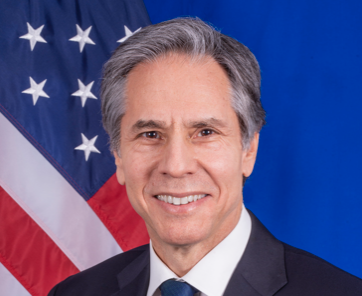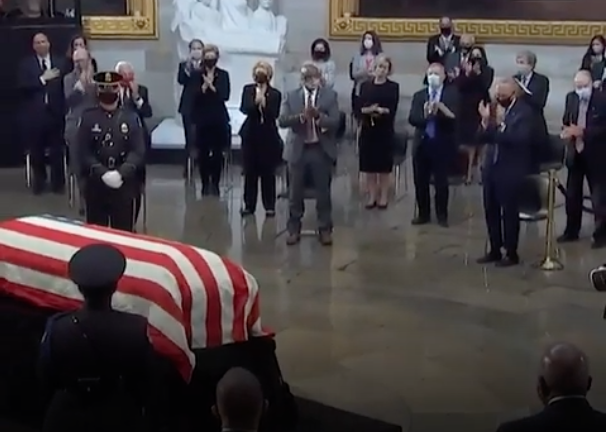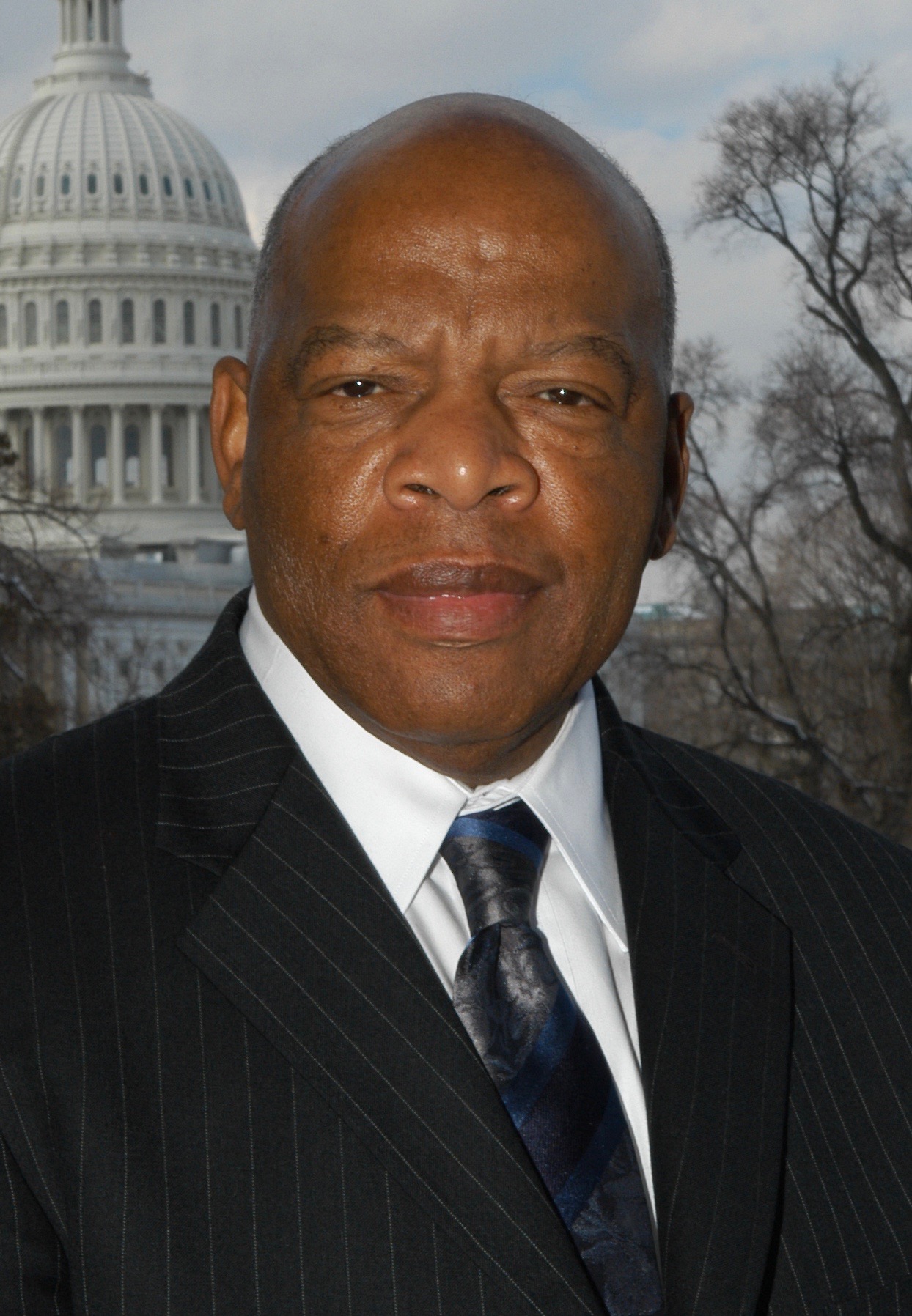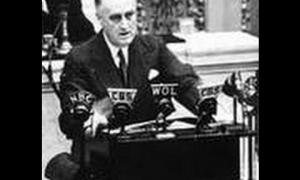Israel Must Be a Partner to Palestinian Leaders
January 10, 2024
If Israel wants its Arab neighbors to make the tough decisions necessary to help ensure its lasting security, Israeli leaders will have to make hard decisions themselves.
This is my fourth trip to Israel since the horrific Hamas attacks of October 7th, so I’m here just over three months – 95 days – since those attacks occurred.
We know that for the people who were most affected by the attacks and the conflict that’s followed, time moves differently.
Immediately before this, I met with the families of hostages being held in Gaza and with hostages who’ve been released. Several of those families I’ve now met multiple times. For them, every day, every hour, every minute that they’re separated from their loved ones is an eternity.
Time feels different for families in Gaza as well, hundreds of thousands of whom are experiencing acute food insecurity. For the mother or father trying to find something to feed a hungry child, the passage of another day without food is excruciating.
Time also feels different for Israelis and Palestinians whose innocent loved ones have been killed. For them, time often falls into “before” and “after” — the “after” filled with a loss that most of us will never know and cannot fully imagine.
And those are just a few examples of how heavy these 95 days have felt — and continue to feel — for the people most affected by this conflict.
This immense human toll is one of the many reasons that we continue to stand with Israel in ensuring that October 7th can never happen again.
It’s also why we’re intensely focused on bringing the remaining hostages home, addressing the humanitarian crisis and strengthening protection of civilians in Gaza, and preventing the conflict from spreading.
And it’s the reason we’re working urgently to forge a path toward lasting peace and security in this region.
We believe the submission against Israel to the International Court of Justice distracts the world from all of these important efforts. And moreover, the charge of genocide is meritless.
It’s particularly galling, given that those who are attacking Israel – Hamas, Hezballah, the Houthis, as well as their supporter, Iran – continue to openly call for the annihilation of Israel and the mass murder of Jews.
On this trip, I came to Israel after meeting with the leaders of Türkiye, Greece, Jordan, Qatar, the United Arab Emirates, Saudi Arabia.
All of those leaders share our concern about the spread of the conflict. All of them are committed to using their influence, using the ties that they have to prevent it from escalating, to deter new fronts from opening.
In addition, all expressed grave concern about the dire humanitarian situation and the number of civilians killed in Gaza.
We know that facing an enemy that embeds itself among civilians – who hides in and fires from schools, from hospitals – makes this incredibly challenging. But the daily toll on civilians in Gaza, particularly on children, is far too high.
Important progress has been made in increasing the amount of aid getting into Gaza, including by opening Kerem Shalom.
Nonetheless, 90 percent of Gaza’s population continues to face acute food insecurity, according to the United Nations. For children, the effects of long periods without sufficient food can have lifelong consequences.
As I underscored in our meetings today, more food, more water, more medicine, other essential goods need to get into Gaza. And then once they’re in Gaza, they need to get more effectively to the people who need them.
And Israel needs to do everything it can to remove any obstacles from crossings to other parts of Gaza. Improving deconfliction procedures to ensure that the aid can move safely and securely is a critical part of that.
The United Nations is playing an indispensable role in addressing the immense humanitarian needs in Gaza. There is simply no alternative.
UN personnel and other aid workers in Gaza are demonstrating extraordinary courage by continuing to provide lifesaving services in what are extremely challenging conditions.
I spoke last night with the UN’s new Senior Humanitarian and Reconstruction Coordinator for Gaza Sigrid Kaag about all of these efforts that are underway.
Now, Sigrid Kaag is someone I worked very closely with a few years ago, when she led the UN mission that destroyed the Assad regime’s chemical weapons in Syria. So, I can say from experience she has what it takes to get this job done.
She has America’s full support. She must have Israel’s as well.
Today, we also discussed the phased transition of Israel’s military campaign in Gaza. We continue to offer our best advice for how Israel can achieve its essential goal of ensuring that October 7th can never be repeated. And we believe Israel has achieved significant progress toward this fundamental objective.
As Israel’s campaign moves to a lower-intensity phase in northern Gaza, and as the IDF scales down its forces there, we agreed today on a plan for the UN to carry out an assessment mission. It will determine what needs to be done to allow displaced Palestinians to return safely to homes in the north.
Now, this is not going to happen overnight. There are serious security, infrastructure, and humanitarian challenges. But the mission will start a process that evaluates these obstacles and how they can be overcome.
In today’s meetings I was also crystal clear: Palestinian civilians must be able to return home as soon as conditions allow. They must not be pressed to leave Gaza. As I told the prime minister, the United States unequivocally rejects any proposals advocating for the resettlement of Palestinians outside of Gaza, and the prime minister reaffirmed to me today that this is not the policy of Israel’s government.
We also spoke about the tensions on Israel’s northern border with Lebanon, where Hezballah continues to launch daily rocket attacks on Israel. As I told the war cabinet and other senior officials, the United States stands with Israel in ensuring its northern border is secure. We’re fully committed to working with Israel to find a diplomatic solution that avoids escalation and allows families to return to their homes, to live securely in northern Israel and also in southern Lebanon.
Finally, we continue to discuss how to build a more durable peace and security for Israel within the region. As I told the prime minister, every partner that I met on this trip said that they’re ready to support a lasting solution that ends the long-running cycle of violence and ensures Israel’s security. But they underscored that this can only come through a regional approach that includes a pathway to a Palestinian state.
These goals are attainable, but only if they’re pursued together. This crisis has clarified you can’t have one without the other, and you can’t achieve either goal without an integrated regional approach.
To make this possible, Israel must be a partner to Palestinian leaders who are willing to lead their people in living side by side in peace with Israel and as neighbors. And Israel must be – must stop taking steps that undercut Palestinians’ ability to govern themselves effectively. Extremist settler violence carried out with impunity, settlement expansion, demolitions, evictions all make it harder, not easier, for Israel to achieve lasting peace and security.
The Palestinian Authority also has a responsibility to reform itself, to improve its governance – issues I plan to raise with President Abbas, among others, when we meet tomorrow.
If Israel wants its Arab neighbors to make the tough decisions necessary to help ensure its lasting security, Israeli leaders will have to make hard decisions themselves.
When President Biden addressed the people of Israel days after the October 7th attack, he made a very simple pledge: The United States has Israel’s back today, tomorrow, always. The friendship between our nations is truly exceptional. It’s our unique bond and America’s enduring commitment to the people of Israel that allows – indeed, demands – that we’re as forthright as possible in the moments when the stakes are highest, when the choices matter the most. This is one of those moments.
Happy to take some questions.




